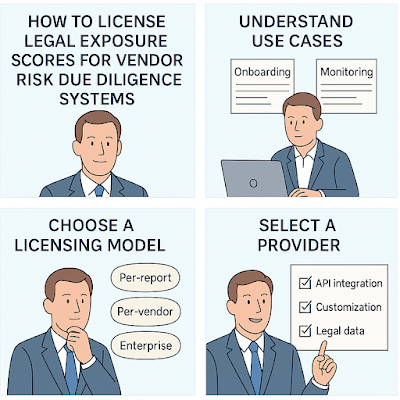How to License Legal Exposure Scores for Vendor Risk Due Diligence Systems
In a world where vendor ecosystems are more complex than ever, licensing legal exposure scores can play a critical role in risk mitigation.
These scores provide quantifiable insight into the legal standing and potential litigation risks of vendors—helping legal, compliance, and procurement teams make smarter, faster decisions.
This guide will show you how to license, integrate, and deploy legal exposure scores in your due diligence systems.
📑 Table of Contents
- What Is a Legal Exposure Score?
- Why License Legal Exposure Scores?
- How to License Legal Exposure Scores
- Integrating Scores into Vendor Risk Platforms
- Top Providers of Legal Exposure Data
- Conclusion
What Is a Legal Exposure Score?
A Legal Exposure Score (LES) is a data-driven metric used to estimate the potential legal risks associated with a company or vendor.
These scores often include variables like the number of lawsuits, frequency of litigation, industry-specific compliance breaches, and regulatory flags.
Organizations use LES to assess risk before signing vendor contracts, during procurement evaluations, and within continuous monitoring systems.
Why License Legal Exposure Scores?
By licensing LES data, companies avoid costly litigation surprises and ensure that vendors align with corporate risk thresholds.
Licensing also grants access to regularly updated datasets, providing dynamic insights instead of one-time assessments.
It can improve audit trails, compliance verification, and even ESG scoring for investors and regulatory bodies.
How to License Legal Exposure Scores
1. Identify your use case: Are you using LES for onboarding, contract renewal, or ongoing compliance?
2. Choose your licensing model: Options include per-report, per-vendor, or enterprise-wide access.
3. Select a provider: Make sure they offer API integration, customization, and historical legal data.
4. Review terms and SLAs: Confirm update frequency, uptime guarantees, and data accuracy levels.
5. Pilot and scale: Test with a small vendor subset before rolling out organization-wide.
Integrating Scores into Vendor Risk Platforms
Modern GRC and procurement platforms support third-party risk scoring modules via API.
By integrating LES through RESTful APIs, companies can automate workflows such as flagging vendors that exceed a legal risk threshold or triggering due diligence reviews.
Consider setting up real-time alerts or monthly score snapshots for high-value vendors.
Top Providers of Legal Exposure Data
When selecting a provider, ensure they offer verifiable legal datasets and reputable analytics models.
Here are some popular options:
Conclusion
Licensing legal exposure scores is a forward-thinking move for organizations looking to stay ahead of compliance and litigation risks.
By embedding these scores into your vendor evaluation systems, you gain a competitive edge in governance and reputation management.
Start small, test rigorously, and expand strategically to build a more resilient vendor risk ecosystem.
Keywords: legal exposure score, vendor risk management, compliance automation, due diligence, API risk scoring

